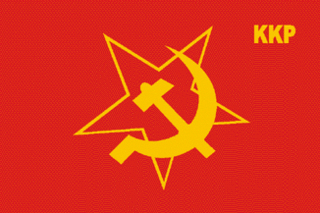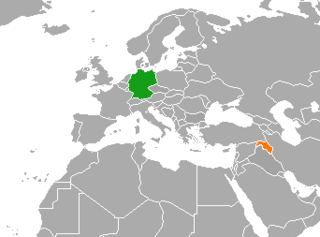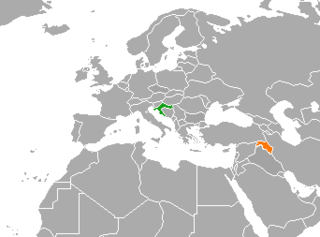
The Patriotic Union of Kurdistan is a Kurdish political party in Iraqi Kurdistan. The PUK describes its goals as self-determination, human rights, and democracy and peace for the Kurdish people of Kurdistan and Iraq. The current Secretary General is Kosrat Rasul Ali. Fuad Masum, co-founder of the PUK, was the President of Iraq from 2014 to 2018. It was founded on 22 May 1975 in Iraqi Kurdistan by Adel Murad, Nawshirwan Mustafa, Ali Askari, Fuad Masum, Jalal Talabani and Abdul Razaq Feyli.

Kurdistan or Greater Kurdistan is a roughly defined geo-cultural historical region wherein the Kurdish people form a prominent majority population and Kurdish culture, languages, and national identity have historically been based. Kurdistan roughly encompasses the northwestern Zagros and the eastern Taurus mountain ranges. The territory corresponds to Kurdish irredentist claims.

Barham Salih is the 8th and current President of Iraq. He is the former Prime Minister of the Kurdistan Region and a former deputy prime minister of the Iraqi federal government. He was elected and assumed office as the President of Iraq on 2 October 2018.

The Kurdistan Regional Government (KRG) is the official ruling body of the autonomous Kurdistan Region.

The Flag of Kurdistan was created by Xoybûn during the Ararat rebellion against Turkey in 1928, where it was hoisted by thousands of Kurdish rebels. The flag was subsequently presented to the European powers at the Versailles Peace Conference. When the Republic of Kurdistan in Iran was proclaimed in 1947, Mustafa Barzani hoisted the flag in Mahabad and the flag was adopted as the official flag of Kurdistan. Iraq's Kurdistan Region has since adopted the same flag as the official flag.

The Communist Party of Kurdistan is a political party in Turkey, founded in 1982 as the Kurdish branch of the Communist Labour Party of Turkey (TKEP). Between 1980 and 1982, the TKEP had a Kurdistan Autonomous Organization. In 1990, the KKP became an independent party. The KKP is led by Mehmet Baran.

Masoud Barzani is a Kurdish politician who was President of the Kurdistan Region from 2005 to 2017. However, Barzani's post sparked controversy, as his mandate expired 19 August 2015. He is also leader of the Kurdistan Democratic Party (KDP) since 1979.

The Kurdistan List, also known as the Kurdistan Alliance or the Brotherhood List, is the name of the electoral coalition that ran in the Kurdistan Regional Government parliamentary elections in Iraqi Kurdistan in July 2009. The Kurdistan List represented a coalition of the two main ruling parties in Iraqi Kurdistan, namely the Kurdistan Democratic Party and the Patriotic Union of Kurdistan. It is the successor of the Democratic Patriotic Alliance of Kurdistan.

The Kurdistan Democratic Party, usually abbreviated as KDP or PDK, is one of the main Kurdish parties in Iraqi Kurdistan and Kurdistan Region. It was founded in 1946 in Mahabad in Iranian Kurdistan. The party claims it exists to combine "democratic values and social justice to form a system whereby everyone in Kurdistan can live on an equal basis with great emphasis given to rights of individuals and freedom of expression."

The Republic of Mahabad or Republic of Kurdistan was a short-lived Kurdish self-governing unrecognized state in present-day Iran, from 22 January to 15 December 1946. The Republic of Mahabad arose alongside the Azerbaijan People's Government, a similarly short-lived state.

Relations of Kurdistan Region of Iraq with foreign states and organizations are conducted by the Kurdistan Region. Political stability and a rapidly developing economy have given the KRG the opportunity to pursue a foreign policy independent from the central government's. The KRG's primary body for directing its foreign affairs is the Department of Foreign Relations (DFR). The DFR's foremost objectives are to raise the global profile of the Kurdistan Region, improve the Region's international ties with various governments and international organizations, and present emerging business opportunities in the Kurdistan Region to regional and international actors.

An independence referendum for Kurdistan Region of Iraq was held on 25 September 2017, with preliminary results showing approximately 93.25 percent of votes cast in favour of independence. Despite reporting that the independence referendum would be non-binding, the autonomous Kurdistan Regional Government (KRG) characterised it as binding, although they claimed that an affirmative result would trigger the start of state building and negotiations with Iraq rather than an immediate declaration of independence of Kurdistan. The referendum's legality was rejected by the federal government of Iraq.

The President of Kurdistan Region is the head of an autonomous region in northern Iraq. They are part of the Kurdistan Presidency Council. The current President of Kurdistan Region is Nechirvan Barzani, who assumed office on 1 June 2019.

Hungary–Kurdistan Region relations are bilateral relations between Hungary and the Kurdistan Region. Hungary is represented in Kurdistan Region through a consulate general since November 2014, while Kurdistan Region has no representation in Hungary. Relations are characterized by several high-level talks and close ties. The Kurdish President Massoud Barzani visited Hungary in 2012 and in 2015 on official visits. Moreover, Hungarian Prime Minister Viktor Orbán uttered support for the independence of Kurdistan Region from Iraq in 2015 causing concern among the Islamic Supreme Council of Iraq.

Czech Republic–Kurdistan Region relations are bilateral relations between the Czech Republic and the Kurdistan Region. The Czech Republic is represented in the Kurdistan Region through a consulate general in Erbil since 2006, while the Kurdistan region has no representation in the Czech Republic. Relations between the two are characterized by high level talks and cooperation against ISIS. Kurdish President Massoud Barzani visited the Czech Republic in 2015, meeting President Miloš Zeman and other senior government officials. In November 2015, Czech President Miloš Zeman said that he believes the Kurdistan Region will soon become independent.

Austria–Kurdistan Region relations are bilateral relations between Austria and the Kurdistan Region. Austria is represented in Kurdistan Region through a commercial office in Erbil since 2006, while Kurdistan Region has a representation in Vienna since 2012. Kurdish President Masoud Barzani has met the Austrian President Heinz Fischer on three occasions in Vienna; in 2011, 2014 and in 2015 on official visits. Austrian Foreign Minister Sebastian Kurz visited Erbil in 2015 and 2016 to boost ties and humanitarian aid.

Kurdistan Region–Poland relations are bilateral relations between Kurdistan Region and Poland. Kurdistan Region is represented in Poland through a representation in Warsaw since 2004, while Poland has a consulate general in Erbil since 2012. In 2005, Polish Prime Minister Marek Belka, Foreign Minister Adam Rotfeld, Minister of National Defense Jerzy Szmajdziński and Minister of Culture Waldemar Dąbrowski met Kurdish President Masoud Barzani and Prime Minister Nechirvan Barzani in Erbil and stated their support for the reconstruction of Iraq, including Kurdistan Region.

Germany–Kurdistan Region relations are bilateral relations between Germany and Kurdistan Region. Germany has a consulate general in Erbil since 2012, and Kurdistan Region has a representation in Berlin since 1992. Many high-level meetings have been held between the two parties, including a visit to Berlin by Kurdish President Masoud Barzani in 2009, where he met with German Chancellor Angela Merkel and Foreign Minister Frank-Walter Steinmeier. In 2014, President Barzani described Germany as "one of Kurdistan Region’s staunch allies in the war against the Islamic State." German Consul General Marc Eichhorn described the relations as "excellent".

Croatia–Kurdistan Region relations are bilateral relations between Croatia and Kurdistan Region. Croatia has plans of opening a consulate in Erbil, while Kurdistan Region has no representation in Croatia. In August 2014, after a request by the United States, Croatian authorities sent an undisclosed amount of weapons to Kurdistan Region. The weapons were mostly of Yugoslav origin. Later, it was revealed that the military aid included 20,000 pieces of HS Produkt VHSs.

France–Kurdistan Region relations are bilateral relations between France and Kurdistan Region. France has a consulate general in Erbil and Kurdistan Region has a representation in Paris. The ties between France and Kurdistan Region have been very close since the presidency of François Mitterrand (1981–1995), when his wife Danielle Mitterrand played an instrumental role in the campaign for the no fly zone over Kurdistan Region in 1991. France has a military presence in Kurdistan Region, and Consul General Dominique Mas described their relations as being "historic" and "long-term".


















